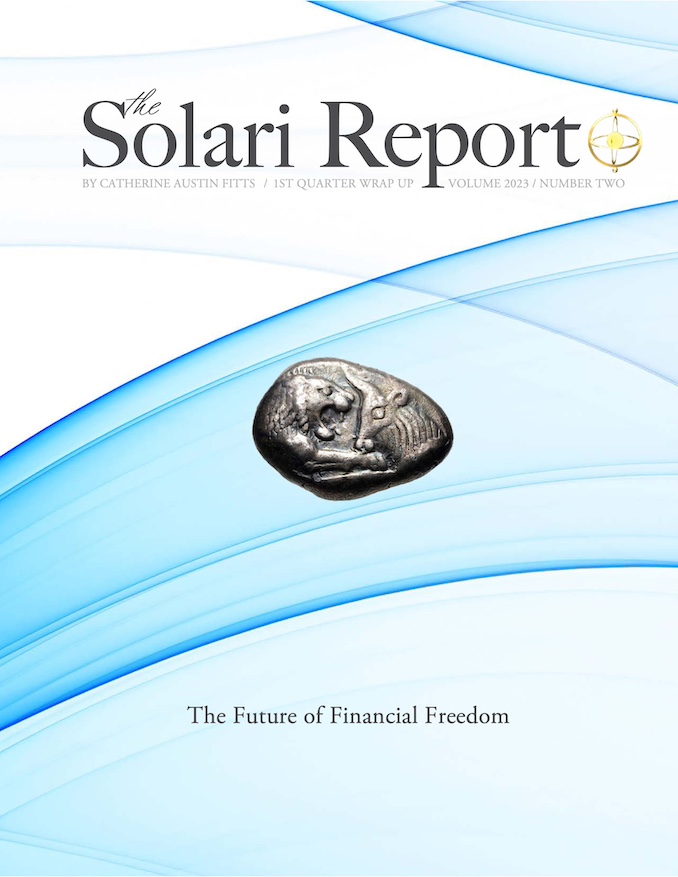
A Short Preview (Login to Access the Full Interview):
[Errata: At 30+ mins in, Catherine refers to a former Fed governor who she admires as Larry Summers. Oops. She meant Larry Lindsey.]
“The book … highlights the implications for the rest of the world, and raises important questions about the concentration of power within central banks.”
~ Description of Princes of the Yen by Richard A. Werner
By Catherine Austin Fitts
This week, we continue the publication of our 1st Quarter 2023 Wrap Up, focusing on the theme of financial transaction freedom. We review the multiple threats to transaction freedoms and talk about steps we can take to protect ourselves, including the potential role of sovereign state banks.
My guest, Richard A. Werner, is the world’s leading expert on central banks. Professor Werner is a London School of Economics and Oxford-educated economist, a university professor of banking and economics (University of Winchester, England), an authorized investment adviser, and an economic adviser to governments. His best-selling book, Princes of the Yen (published in Japan in 2001 and in the English-speaking world in 2003), formed the basis for the 2014 documentary by the same title, with both book and film exploring the power of central banks—often shrouded in secrecy—to transform economies. The film’s director, Michael Oswald, described Prof. Werner’s theory and findings as “truly earth shattering.”
Earlier this year, the Solari Report commissioned Prof. Werner to write the briefing memo titled “Why a Sovereign State Bank Is Good for Tennessee,” a memo intended to educate Tennessee legislators—and legislators in other states. A sovereign state bank can help states counter threats to state-level sovereignty and economic prosperity and also halt the ominous trend of banking system concentration. In this interview, he and I will elaborate on the numerous reasons why this is such a timely topic deserving of both legislators’ and citizens’ attention.
Currently, the Bank of North Dakota is the only such bank in existence in the U.S.—and it provides an excellent model that other states can emulate. A sovereign state bank that supports (rather than competes with) private local banks and credit unions can protect and reinvigorate the community banks that are the lifeblood of small and medium-sized enterprises and hence, thriving local and state economies.
In early May, we will complete publication of the 1st Quarter 2023 Wrap Up with my quarterly Equity Overview—an interview with Tim Caban when he joins me in Pennsylvania.
Money & Markets
In Money & Markets this week, John Titus and I will cover the latest events and continue to discuss the financial and geopolitical trends we are tracking in 2023—and the growing pushback against corruption. Post questions at the Money & Markets commentary here.
Related Solari Reports:
Why a Sovereign State Bank Is Good for Tennessee
The Solari Papers #2: U.S. State Bullion Depositories
“The Many Excuses for Central Control” (Catherine Austin Fitts with Professor Richard Werner), Session 4 of Doctors for Covid Ethics Symposium, June 11, 2022: Freedom is the Cure: Unpacking & Defeating the Medical Tactics of a World Takeover
Richard Werner on CBDCs: How They Prepare You to Be Their Slave
I Want to Stop CBDCs – What Can I Do?
Let’s Go to the Movies: Week of May 26, 2020 – Princes of the Yen
Other Related Resources:
Princes of the Yen: Japan’s Central Bankers and the Transformation of the Economy
Princes of the Yen: About the Film























































































































I was wrong. “Seventy of our Congressmen are dual citizens.” But this gives me the opportunity to say this. What else would explain the findings of Katherine Watt and Alexandra Latypova; that the DOD was the agency behind the attack on the citizens of the United States. Our entire government has been taken over by a foreign power.
I follow the Solari Report because of the good financial analysis. This particular interview was the best one yet. This interview was excellent.
I went back again to check the timings again, and the offending passage actually begins at about 1.15:30 to about 1.16:30. If you use 1:16, you are at the wrong place. It is an hour later. Sorry for the confusion.
Outstanding interview!!
I’m starting to grasp the BIGGER picture of global economics and monetary system by listening to your interviews, Katherine. Although I avoided business economics/finances in college I was able to run a successful State Farm Insurance agency for 19years. However I have never understood our Fed and monetary system — but have had a strong inner sense of “distrust.” Through Solari I am better understanding what my inner wisdom has always known. Although disturbing, I do prefer being informed so I can be a more active participant in helping “righting the ship” — which has been on a very destructive and corrupt course for far too long.
I appreciate you, your team and all of the wonderful people who graciously share their knowledge, experience and wisdom?
Thank you, Nancy! I am so glad. Good maps truly can unleash us…
It is valuable information to learn and yes, I just want to share it out too!
But i think sometimes its better to fully understand it and then share or question those around you about these concepts in a conversation instead of sending a video that they’ll just ignore. Make others think.
Macro economics and a lot of financial concepts has been purposefully kept confusing for too long but I think we’re entering times when a lot of sunlight will be shone on everything and covid definitely opened many many doors of questioning by the public.
Thank you for this very enlightening interview!! It gives a big picture perspective on what is going on and empowers us to make good choices for the benefit of ourselves and others. My gratitude to Catherine and the whole Solari team.
This interview and Dr. Werner’s work is so spot on and a great roadmap for action: Well run, local, decentralized banks with an honestly run state central bank. Time to enlighten our banker.
I was an Econ major in college, figured out the overarching fiscal ‘theory’ was absurd years later, but this presents… real ideas via good data. Very clear and mostly understandably for the non-Economics oriented!